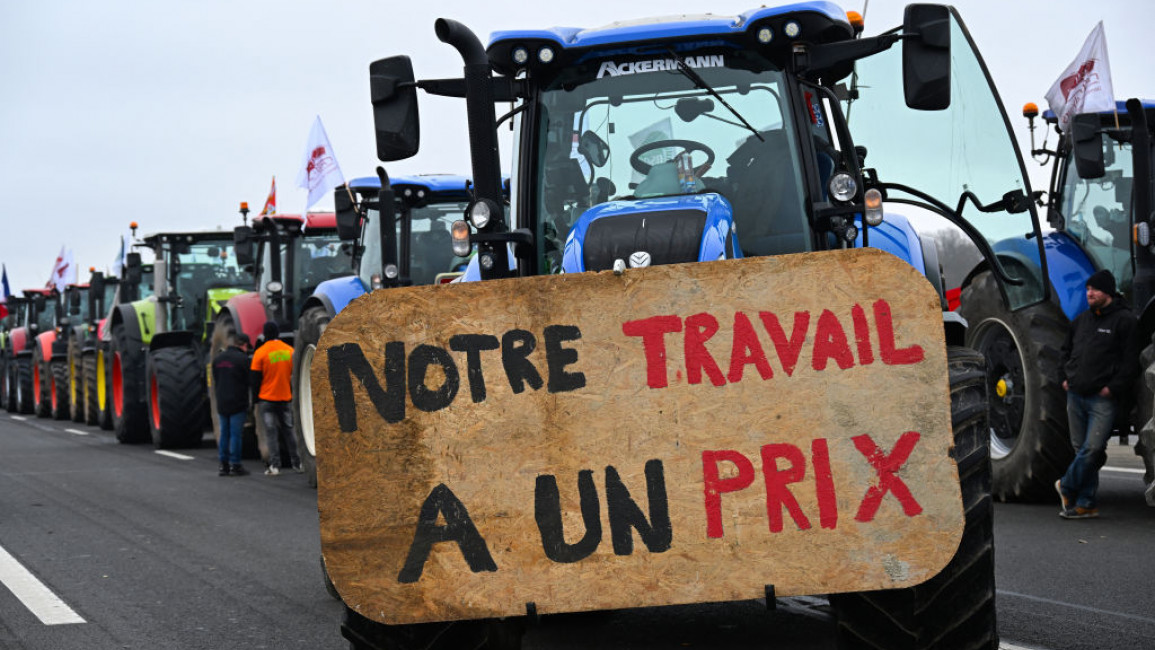How are Moroccan tomatoes fuelling France's farmers protests?
In France, angry farmers have dumped dozens of kilograms of Moroccan tomatoes in supermarket parking lots over the past week in protest of 'unfair competition.' However, Moroccan exporters refuse to be caught in the crosshairs of Paris' politics.
"Our products (Moroccan tomatoes) are not invading France or Europe. We are subjected to rigorous requirements," argues a Moroccan Exporters' Association representative in the condition of anonymity.
So far, Moroccan exporters associations have avoided officially addressing the French farmers' accusations.
In 2022, Morocco became the top supplier of tomatoes to the European Union. In the same year, Rabat exported 424.690 tonnes of tomatoes, according to the Moroccan Association of Fruit and Vegetable Producers and Exporters.
"Operation Paris Siege"
— Hassan Mafi (@thatdayin1992) January 31, 2024
French farmers have encircled Paris, blocking all highways to France's capital.pic.twitter.com/gnNbPMboNT
Cheap labour and the EU's 'tax exemptions deal' have facilitated the domination of the French market by Moroccan tomatoes, making them a favourite for customers and retail chains that always seek 'petits prix' deals. For instance, the Moroccan cherry tomato is 2.4 times cheaper than the French one. One of the reasons for these low prices is that the daily wage of tomato harvesters is less than US$1.5 per hour in Morocco.
Precisely, the free trade agreement between Morocco and the European Union does not categorically eliminate taxes for Moroccan tomatoes.
Moroccan tomatoes are subject to certain rules of entry prices and annual limitations: not more than 285,000 tons between October and May – beyond this quota, taxes apply. Outside this period, Moroccan tomatoes can still benefit from a 60% discount, but on the condition that they are not sold at prices lower than those set by the World Trade Organization (WTO).
"The quotas set by the free trade agreement with the EU are meticulously adhered to. Quantities exported outside of these quotas are subject to specific tariffs, which we respect," added the anonymous source from the Moroccan Exporters' Association.
Meanwhile, French giant companies have primarily benefited from the tax deal while growing their crops in Morocco and selling them in France for prices that small French farmers cannot afford to compete with.
According to the French daily Le Monde, one of these companies is Azura. Established in 1998 in an alliance between Moroccan businessman Mohamed Tazi and Breton entrepreneur Jean-Marie Le Gall, Azura estimates its revenue to be "€400 million" in 2022. Its main clients in France are large retail chains.
French farmers have been out in force for over a week using tractors to block critical roads into Paris and other major highways nationwide.
Farmers' complaints extend from stringent environmental regulations to cheap imports from non-EU nations like Ukraine and Morocco, yet primarily focus on the challenge of sustaining livelihoods in a capitalist world.
French protesters set a truck alight and overturned it with a tractor. Farmers in France have been protesting, demanding better remuneration for their produce, less red tape and protection against cheap imports. https://t.co/eolaaIVjqG pic.twitter.com/pn4IVvsa7Z
— ABC News (@ABC) January 29, 2024
On 1 February, two main farming unions, FNSEA and Young Farmers, announced the suspension of the action, urging the protesters to take their tractors off the streets after Prime Minister Gabriel Attal promised financial aid, eased regulations and protection against unfair competition.
Meanwhile, other unions, such as the Farmers' Confederation, have decided to stay mobilised, arguing that Attal's promises are insufficient to solve the crisis.
"According to information gathered from the export control and coordination establishment Morocco Foodex, the pace of agricultural product exports to Europe continues as usual," said Lahoucine Adardour, president of the Moroccan Interprofessional Federation for the Production and Export of Fruits and Vegetables (FIFEL).
The farmers' blockade, among the most furious protests France has seen in recent years, has spread across the European continent, prompting farmers in Brussels to mobilise as well, using their tractors to blockade the city's main streets.



